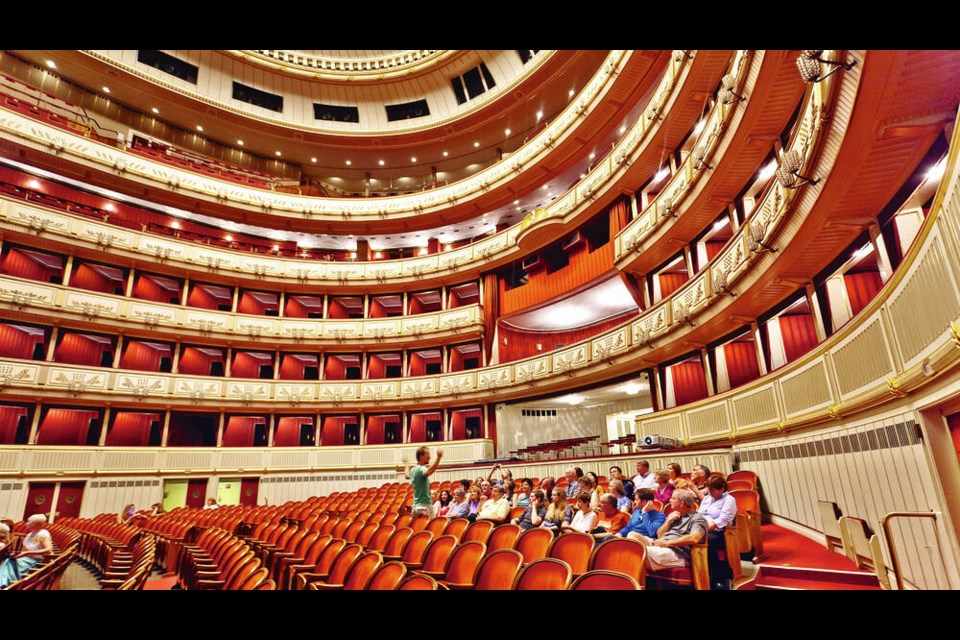Music lovers find special delights in Austria. At my favourite hotel in Salzburg, I lie in bed 100 meters from Mozart’s dad. He’s just outside my window in the graveyard of the St. Sebastian church. When in town, I like sleeping within easy earshot of its bells. The bells of Salzburg ring with a joyful exuberance. They wouldn’t if its citizens didn’t like it that way.
And by scheduling a Sunday in Salzburg, I enjoy a music-filled Mass in its cathedral — the first great Baroque church north of the Alps. And this is not just any church music. The 10 a.m. Mass often comes with both a choir and an orchestra. They pack the loft, turning the church’s back wall into a wall of sound. On my last visit, I snared a dizzying perch high on the side to enjoy a bird’s-eye view of the musical action. Far below me, a thousand people faced the altar. I faced the loft where, for two years of Sundays, Mozart served as organist. I imagined Mozart on that keyboard surrounded by the same Baroque scrolls, Italianesque frescoes, and dancing cupids. The conductor’s furious baton churning out today’s Mass completed the image.
Salzburg is a world-class destination for live music performances. Each summer it hosts its famous Salzburg Festival, but the city is busy with music offerings throughout the year, putting on more than 2,000 classical performances in its palaces and churches annually. I’ve never planned in advance, and I’ve enjoyed great concerts with every visit. If you can’t shell out for classy performances, just keep your ears perked for musicians practicing near an open window.
As I walked to lunch after Mass, a woman biked by me, artfully towing a tiny wagon under the spires. On it was a tall triangular black leather case. I said, “Wow, only in Salzburg…a bike towing a harp.” She looked at me and said, “A Celtic harp.” At the ATM a few minutes later, I met a woman from a Sweet Adelines choir. She said, “We travelled all the way from Virginia to sing here in Salzburg … the people love us here.”
Austria seems filled with visiting bands and choral groups. They come in droves hoping to simply make music in places where so many have made beautiful music over the generations. To have any kind of audience is a bonus.
Even in Austria’s tiny towns, you feel a special passion for music. Later, on that same trip, I lingered in a humble village church that felt lifeless. Suddenly the dozen or so tourists loitering around me burst into a rich Slavic hymn — invigorating the church. They were a folk group from Slovakia who, they explained, “couldn’t be in a church without singing.”
While Salzburgers don’t like to admit it, for centuries Vienna has been, and still is, the musical big time. I nearly got in a fight with my favourite Salzburg tour guide as I wanted to write in my guidebook that “by age 25, Mozart was ready for the big time and moved from Salzburg to Vienna.” She insisted that was, at best, a lateral move for an up-and-coming musician.
Of course, Vienna has its opera, its magnificent Philharmonic Orchestra, and the much-loved Boys’ Choir. But all of these are generally nowhere to be heard in July and August. They, like so many tourists who want to attend a performance, are on vacation or on the road. And when they are in town and performing, tickets can be tough to get. But in Vienna, there are always plenty of ways to enjoy great music — on any budget.
Year-round, you can find high-quality performances by less famous groups, though those aimed at tour groups can be a little schlocky. As you poke into churches and palaces, you may hear groups practicing — you’re welcome to sit and listen. St. Peter’s Church has free organ concerts daily, and a live orchestra performs during Sunday Mass at the Augustinian Church at the Hofburg.
Perhaps the liveliest Viennese musical experience is absolutely free. On most summer evenings, the park in front of City Hall is crammed with thousands of people enjoying a food circus of colourful stalls — including outposts for some of Vienna’s most esteemed restaurants — and classy entertainment that’s open to everyone.
A 60-foot-wide TV screen up against the neo-Gothic facade of City Hall is blank during the day, but as the sun sets, people start settling into the comfy benches. Then darkness falls, and filmed performances are projected on the screen — on any given night, it could be the Vienna Philharmonic, Vienna State Opera, ballet, modern dance, classic folk music, R&B, or even punk, though classical dominates.
For decades, the city has footed the bill for more than 60 different programs each summer. Why? To promote culture. Officials know the City Hall Film Festival is mostly a “meat market” where young people come to see and be seen. But they believe that many of these people will develop a little appreciation of classical music and Austria’s love of the high culture on the side.
In Austria, classical music seems to weather the storms of modernity very well. It wouldn’t if the citizens didn’t like it that way.
This article is used with the permission of Rick Steves’ Europe (www.ricksteves.com). Rick Steves writes European guidebooks, hosts travel shows on public TV and radio, and organizes European tours.



